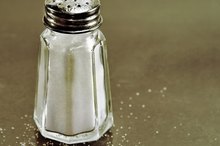What does fact checked mean?
At Healthfully, we strive to deliver objective content that is accurate and up-to-date. Our team periodically reviews articles in order to ensure content quality. The sources cited below consist of evidence from peer-reviewed journals, prominent medical organizations, academic associations, and government data.
- National Library of Medicine: Liver Diseases
- Food and Drug Administration: Lowering Salt in Your Diet
The information contained on this site is for informational purposes only, and should not be used as a substitute for the advice of a professional health care provider. Please check with the appropriate physician regarding health questions and concerns. Although we strive to deliver accurate and up-to-date information, no guarantee to that effect is made.
Sodium and Liver Damage
If you have too much salt in your diet, that excess sodium won't cause liver damage, according to the National Library of Medicine 1. But if you have liver damage due to another reason--perhaps a virus such as hepatitis or damage due to excessive alcohol consumption--your doctor may ask you to limit your sodium intake in an effort to reduce stress on your liver.
Significance
Without some salt in your diet, your body cannot maintain the proper balance of fluids, according to the U.S. Food and Drug Administration 2. However, most Americans consume far more salt than necessary. The U.S. Recommended Daily Allowance for sodium for adults is about a teaspoon per day, or 2,300 mg. Older adults and those with hypertension, or high blood pressure, need even less--perhaps around 1,500 mg each day. If you have liver damage, it's likely your doctor will ask you to reduce your sodium intake to 1,500 mg or less.
- Without some salt in your diet, your body cannot maintain the proper balance of fluids, according to the U.S. Food and Drug Administration 2.
Effects
Foods Known to Damage the Liver
Learn More
Your liver helps to process the fluids you consume, according to the University of Maryland Medical Center, or UMMC. Because you retain more water when you eat more salt, you'll drink more water and retain more water--and that increases the stress on your damaged liver. You might experience swelling due to retained water if you have liver damage.
Function
Your doctor will tell you how much salt you can consume safely with your damaged liver. To stick to this amount, you need to know where salt appears in your diet. Table salt added in cooking or while eating only accounts for up to 10 percent of all dietary salt, according to the FDA. Almost all of the remainder comes from processed foods with added salt or from restaurant foods.
- Your doctor will tell you how much salt you can consume safely with your damaged liver.
- To stick to this amount, you need to know where salt appears in your diet.
Prevention/Solution
Are Olives Good for the Kidneys?
Learn More
To follow a low-sodium diet for liver damage, you'll need to learn how to read food labels carefully to find hidden salt, according to the Ohio State University Medical Center. High-sodium foods have more than 300 mg of salt per serving, and you should avoid those foods. If you stick to fresh fruit, vegetables and meats with no added ingredients, rather than processed foods, you should be able to stick to your sodium goals.
Considerations
As part of your diet for liver damage, your doctor likely will ask you to limit protein as well as sodium, according to the University of Maryland Medical Center, or UMMC. If you follow your physician's guidelines on sodium, but still find yourself retaining water or exhibiting unusual thirst, talk to your doctor about potentially revising your dietary goals.
Related Articles
References
- National Library of Medicine: Liver Diseases
- Food and Drug Administration: Lowering Salt in Your Diet
- Food and Drug Administration, Center for Food Safety and Applied Nutrition. You May Be Surprised by How Much Salt You're Eating. Consumer Updates, 2016
- Sea salt vs. table salt, Break Up with Salt. American Heart Association.
Writer Bio
J.M. Andrews has been a professional journalist for more than 20 years. She specializes in health and medical content for consumers and health professionals. Andrews' background in medicine and science has earned her credits in a wide range of online and print publications, including "Young Physicians" magazine.









